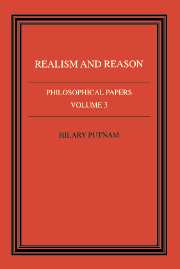Book contents
- Frontmatter
- Contents
- Dedication
- Introduction
- 1 Models and reality
- 2 Equivalence
- 3 Possibility and necessity
- 4 Reference and truth
- 5 ‘Two dogmas’ revisited
- 6 There is at least one a priori truth
- 7 Analyticity and apriority: beyond Wittgenstein and Quine
- 8 Computational psychology and interpretation theory
- 9 Reflections on Goodman's Ways of Worldmaking
- 10 Convention: a theme in philosophy
- 11 Philosophers and human understanding
- 12 Why there isn't a ready-made world
- 13 Why reason can't be naturalized
- 14 Quantum mechanics and the observer
- 15 Vagueness and alternative logic
- 16 Beyond historicism
- Bibliography
- Acknowledgements
- Index
10 - Convention: a theme in philosophy
Published online by Cambridge University Press: 06 January 2010
- Frontmatter
- Contents
- Dedication
- Introduction
- 1 Models and reality
- 2 Equivalence
- 3 Possibility and necessity
- 4 Reference and truth
- 5 ‘Two dogmas’ revisited
- 6 There is at least one a priori truth
- 7 Analyticity and apriority: beyond Wittgenstein and Quine
- 8 Computational psychology and interpretation theory
- 9 Reflections on Goodman's Ways of Worldmaking
- 10 Convention: a theme in philosophy
- 11 Philosophers and human understanding
- 12 Why there isn't a ready-made world
- 13 Why reason can't be naturalized
- 14 Quantum mechanics and the observer
- 15 Vagueness and alternative logic
- 16 Beyond historicism
- Bibliography
- Acknowledgements
- Index
Summary
When one reads Quine, or Carnap, or Wittgenstein one encounters virtually no references to literature, or, indeed, to the arts. Yet certain themes in literature have a striking resemblance to themes in analytical philosophy. Thus Carnap celebrates the conventional, the artificial, the planned; Wittgenstein the natural, the organic, the traditional (although Wittgenstein's celebration of the traditional has a distinctively modern quality; it is the traditional without any of the traditional premises that he wishes us to retain). A deep examination of the notion of convention is one of the great contributions of analytical philosophy. In this essay, I want to review that contribution. At the end, I shall return to the remark that themes in the discussion have echoed themes in literature, and permit myself to speculate on what that shows about philosophy itself.
The conventional versus the natural
The nature of logical and mathematical truth has been a problem for empiricism from the beginning. Hume's explanation of logical necessity, that it has to do with one idea ‘containing’ another, presupposed the atomistic and sensationalistic psychology which he helped to found. ‘All bachelors are unmarried’ is analytic (true in virtue of the relations among our ideas) because the idea of being unmarried is contained in the idea of a bachelor; but does this mean simply that my mental picture of a bachelor happens to be a picture of an unmarried person? Kant retained some of the flavor of Hume's verbal formulation while giving up the identification of ideas with mental pictures or anything like mental pictures.
- Type
- Chapter
- Information
- Philosophical Papers , pp. 170 - 183Publisher: Cambridge University PressPrint publication year: 1983
- 3
- Cited by



